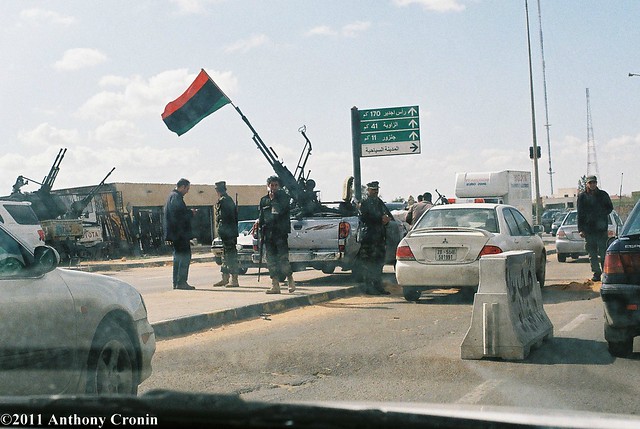
IHS’ Richard Cochrane reports that despite some success the interim government has had ahead of the planned June 2012 national elections in bringing militias to heel — 8,000 militiamen are now “pledged” to become border guards — several obstacles remain to the NTC’s efforts to establish a secure state. A plan to distribute payments to militiamen and their families — essentially, a plan to secure legitimacy for the NTC in the fighters’ eyes — has been undermined by the NTC’s reliance on militias to manage the payments. The result of which, unfortunately but unsurprisingly, has been an uneven, unaccountable distribution of the money:
Names have been omitted from payment lists and others erroneously added, sparking angry protests, some of which have descended into violence. Local media has reported several incidences of militia groups plundering payment centres located in rival neighbourhoods, or in areas deemed to be insufficiently loyal to the spirit of the revolution.
This is the least of the government’s militia problems, though. Only in March did militia leaders agree to “turn over to the interim govenrment strategic sites, such as airports and border crossings,” to the NTC (the AFP’s correspondent for Libya, Dominique Soguel, hinted that given Libya’s size and limited infrastructure, official control of airports is a much—needed objective for the NTC to accomplish). While separatist stirrings in eastern Libya received substantial attention from the government — and a relatively swift political response that has somewhat dimmed the prospects of federal autonomy — ongoing fighting in southern Libya has reportedly left dozens dead in the past few months. Although the non-Arab minority population in the region supported the NTC, tribal rivalries — and, in the International Crisis Group’s view, a lack of a functioning judicial system or police force — have flared up. To the north, on Libya’s western coast, Berber and Arab militias continue to clash. In both the south and west, the NTC’s armed forces have had a difficult time imposing cease fires. One reason for this is that “even when government security forces are dispatched to resolve crises, there is no guarantee that they will be the strongest force in the area,” an IHS report noted, though the main hindrance is still the NTC’s difficulties in co—opting the new armed groups and the old state machinery.
Outside support to the NTC remains limited. The outcome of a trans—Saharan conference on border security is presumably up in the air following the coup in Mali. And the UN Support Mission in Libya (UNSMIL) is “not a peacekeeping mission but was there to assist the Libyan authorities to help them create the necessary institutions to govern the country and ensure the respect of fundamental rights for all,” a spokesperson told Xinhua recently, also noting in a press conference that “the main responsibility of disarming and integrating the militias” falls to the NTC.
Of course this is the case: an externally imposed agreement would not be regarded as legitimate. But so far, the NTC has failed to do either on its own, as cannot expect a “third force” in the form of a peacekeeping mission — and it is not clear the NTC even desires such a mission. But it is one thing to subpoena oil majors like Eni SpA and Total SA over their past conduct in Libya, and quite another to do so over all these armed groups, especially those in Misrata who make incursions into refugee camps near Tripoli. Perhaps the trial of of Saif al—Islam Qadhafi, who will probably be tried Libya, instead of going to France or the ICC, will send a message — though the biggest problem now is not holding Qahdafi loyalists accountable, but gaining authority over the NTC’s ostensible followers. That message, though, is not being received well by human rights groups and the UN, which suspect the proceedings may amount to a kangaroo court since, as noted above, the NTC has not yet set up judiciary.
At this point, the NTC has to hope that in keeping its electoral schedule, that the militias do not engage in voter intimidation, though some militias are reportedly already looking to set up political arms to run in the Constituent Assembly elections. “If the leaders of local militias were to decide to intervene to influence the outcome of an election, there is no power or authority that could stop them,” North Africa watcher George Joffe told Agence France Presse. Libya may yet prove to be the exemplar of Obama’s foreign policy, but not in the way that advocates hoped last year when NATO intervened should the ongoing violence affect the electoral process, which is almost certainly going to be happen — the question is not “if?” but “to what extent?”
[Ed. note: an informative addition on what ordinary life is like in Libya these days can be found in this interview with friend of the blog Geoff Porter.]

